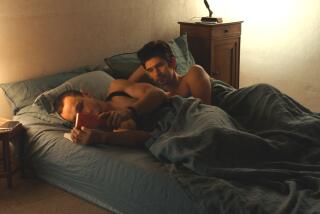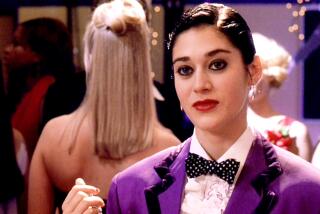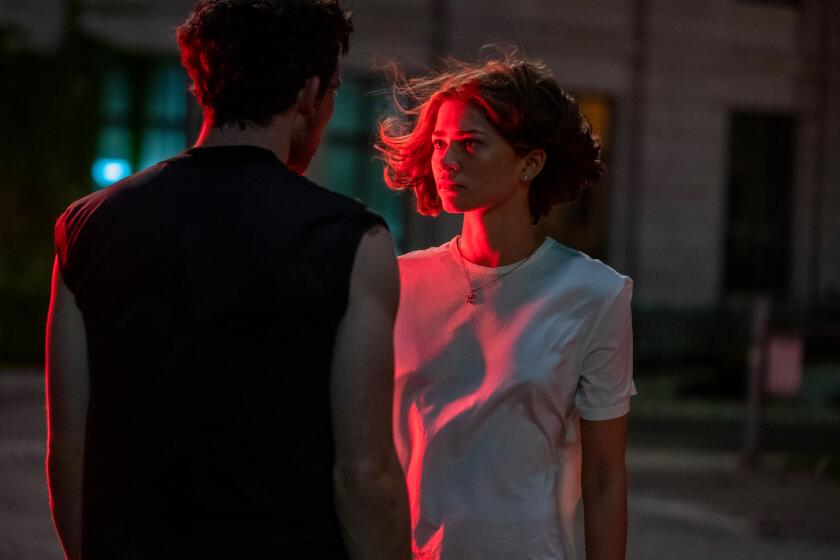‘Blindsight’ climb lets teens soar
One blustery Wednesday morning, half a dozen blind Tibetans took turns leaping off a Dockweiler Beach sand dune in a specially equipped hang glider, daring even for the sighted.
But hang gliding is nothing compared with the group’s treacherous three-week climb up Mt. Everest, a life-altering feat chronicled in the new documentary “Blindsight.” The film, opening Friday in Los Angeles, profiles teenagers Sonam Bhumtso, Gyenshen, Dachung, Kyila, Tenzin and Tashi as they climbed the 23,000-foot north face of Everest in 2004 with a team of professional guides led by blind American mountaineer Erik Weihenmayer.
Aside from the rigors of training and the dangers inherent in high-altitude climbing, the teenagers had to overcome the stigma of being born into families -- and into a culture -- that consider them cursed for evils committed in past lives. Indeed, Tashi lived on the streets as a 10-year-old after his parents sold him to professional beggars, who tortured the boy when he didn’t earn enough money. As the film documents, most of their parents were doubtful their children would make it to the mountain, let alone survive the trek.
“They’ve gone from being pariahs in their culture,” said producer Sybil Robson Orr, “to returning to their villages like rock stars.”
In February, the film’s production company Robson Entertainment funded a two-week trip to Los Angeles and San Francisco as part of a cultural exchange with blind teens from the support organization Junior Blind of America. They hit Disneyland, Universal Studios and Hollywood. On the sand dune in Playa del Rey, the students took turns reflecting on the changes in their lives since the climb.
“It’s a totally different life,” said Kyila, who traveled last fall to the Toronto Film Festival to promote the film. “There are 900 people in my village. I’m the only one who can speak English and Chinese and the first one who went abroad. My parents have never even been to the mountain.”
The teens are all students of Sabriye Tenberken, a blind German educator who established the first school for the blind in Tibet and the group Braille Without Borders (www.braillewithoutborders.org).
Tenberken, 37, who traveled to Tibet on her own at 26 and went on horseback to find students in remote villages, was always looking to challenge and inspire her kids. So after Weihenmayer made history in 2001 by climbing Mt. Everest, Tenberken wrote him, requesting he visit the school. Weihenmayer, however, wanted to train the kids to climb Mt. Everest. He mentioned the idea to a friend of producer Robson Orr, an avid climber. Soon, director Lucy Walker was assembling a crew and heading to Tibet.
“The mountain was, in a way, the drama you could use to get to know these incredible people and their lives,” said Walker.
It was a tough experience that often put Tenberken and Weihenmayer at odds, the film shows.
The teacher just wanted her students to experience the joy of climbing. The world-class mountaineer wanted them to reach the summit. Ultimately, they got within a few thousand feet of their goal before the health of some of the students forced them to return to the base. But everyone considered the trip a success because the kids got farther than they’d ever dreamed -- now categorizing their lives as “before the mountain” and “after the mountain.”
Since the film, the students have set out into the world on their own, launching businesses and traveling overseas on scholarships. Several have become the breadwinners in their families.
Tashi now operates the largest spa for massage in Lhasa. Gyenshen, 20, is the only Braille publisher in Tibet, printing textbooks for blind children in sighted schools. Sonam Bhumtso attends a sighted school in Tibet and aspires to write Tibetan history. Kyila studied English in Britain and now helps operate the Braille Without Borders school.
“Before we climbed the mountain, I didn’t have comfort to do anything,” said Kyila. “If I wanted to do something, I [got] nervous. Now I don’t.”
More to Read
Only good movies
Get the Indie Focus newsletter, Mark Olsen's weekly guide to the world of cinema.
You may occasionally receive promotional content from the Los Angeles Times.






